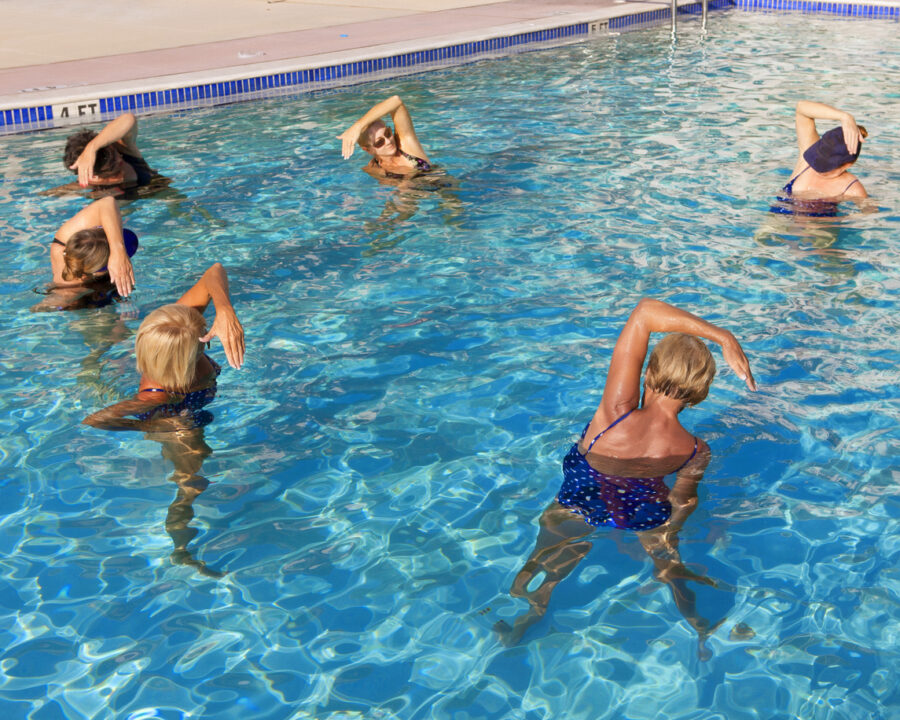I’m a regular at water aerobics at my local JCC. Easy on the joints, no sweating, good music–it’s an absolute treat. Plus, it has taught me some valuable lessons about Jewish ritual and prayer.
One morning, instead of our regular Aqua Zumba, we had Aqua Nia. Nia is a movement practice fusing dance, martial arts, and mindfulness. As we did our hip circles, our teacher instructed: “Isolate to integrate.” She used this line a few times in the class, and it stuck with me, following me home. Focusing on one muscle at a time allowed me to notice with my full attention and intention. What do my hips feel like right now? How can I give them what they would need to feel supported and cared for? When we returned to full body movement, I was both able to notice my hips more AND feel more limber and grounded in my whole body. To isolate is not to sever the parts of ourselves but to bring our full awareness to one part in service of the whole.
Perhaps this is what Shabbat does, what blessings do, what pieces of liturgy are inviting from us. We isolate 25 hours, or a single moment. We are called to pay attention to the fact of our aliveness, or our breath, or the beautiful nature we are a part of. By putting brackets around the moment, we can give it our full attention and care. But the goal is not for the isolation to hold. We can intentionally take what we have learned with us past that moment. Shabbat can help us feel the preciousness of time all week. A blessing practice can help us notice more beauty in the world, and the liturgy we’ve inherited can infuse our lives with more gratitude, awe, and love. I now relish those moments of isolating–of saying this, right here, right now, is what gets my attention. How beautiful that the gift of that moment might reverberate throughout my life!
In another class, we had a substitute teacher who said this in her opening spiel: “This is your workout. If you need to modify an exercise, please do. You know your body best. If you’d like to stay on one exercise or another, please do. I’ll be up here moving us through what I have planned, but do what works for you. This is your workout.” I was so grateful for the permission that this teacher gave us. In that class, I felt more free to adapt, to pause to drink some water, or to push myself harder. While I hypothetically could have done that in any other class, the teacher’s stating this permission aloud made it so I wasn’t afraid of being judged for doing something differently. I didn’t just do my own thing, either. Ninety-five percent of the time, I stayed with the group. But just knowing I could make my own choices within the held space of the planned class made it a more enjoyable experience for me.
I’ve tried to do water aerobics by myself. I last, at best, five minutes. Having a designated time when we all show up is what gets me there. The same thing, I realized, is true about t’fillah (liturgy and prayer). It’s challenging for me to sustain a regular practice, as I’m sure it is for a lot of folks. Having services, times when people are meant to show up, makes it happen. But then what?
The first time I went to synagogue after this class, I sat down in my usual spot and gave myself the permission that my teacher gave to us: This is your service, Eliana. The leader will be guiding us through the liturgy, but this is your service. Linger a bit on a word that is speaking to you. Take a meditative moment to close your eyes and breathe. Go get water if you need it. If you don’t like any given name for the Holy One, use your own. This is your service.
Empowering myself to take services into my own hands has made services more meaningful and enjoyable for me. Instead of focusing on how I might make different choices as a leader, or lamenting that the translations provided aren’t moving me, I find delight, ease, and curiosity. What would it be like to give this gift to yourself? I also now seek to give this permission to the community when I am the one leading services. What if we were empowered to take our services into our own hands? Might this permission help us judge ourselves and others less, and find more transformative meaning in our ancient practice?
Breicha, the word for pool, shares a root with brachah, blessing. Here in the south, outdoor water aerobics has just returned. I can’t wait to get back in the pool of blessing and see what spiritual lessons await.

